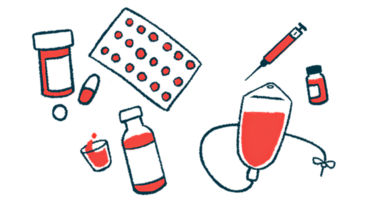Researcher: Rystiggo approval a ‘step forward’ for gMG community
The therapy became first FDA-approved treatment for the condition in June

On June 27, Rystiggo became the first generalized myasthenia gravis (gMG) treatment to be approved by the U.S. Food and Drug Administration (FDA) for adults with antibodies against either the acetylcholine receptor (AChR) or muscle-specific kinase (MuSK) proteins.
While other treatments have been cleared for patients with anti-AChR antibodies — who account for about 85% of all cases — the FDA’s decision means people with the less common anti-MuSK antibodies will now have a treatment option.
“This type of therapy has not yet been approved until now for this population, so Rystiggo represents a step forward,” Vera Bril, MD, the lead investigator of the Phase 3 MycarinG trial that supported its approval, said in a written Q&A with Myasthenia Gravis News. Bril is a professor of medicine at the University of Toronto and director of the neuromuscular section, division of neurology, at the University of Toronto and University Health Network.
At a list price of $6,050 a vial, Rystiggo is expected to become commercially available in the U.S. in the next few months, according to a spokesperson from UCB, its developer. The number of vials a person needs will depend on their body weight and clinical response to treatment, and the out-of-pocket costs will depend on their healthcare coverage. Once it’s available, UCB will have more information on a patient support program to explain financial assistance options.
What is Rystiggo?
Rystiggo is an antibody that blocks the neonatal Fc receptor (FcRn), a protein that stabilizes immunoglobulin G (IgG) antibodies in the bloodstream. IgGs are the most common type of antibody in body fluids and include the self-reactive ones, also known as autoantibodies, that cause MG.
By preventing FcRn from stabilizing these antibodies, Rystiggo would “specifically and rapidly reduce the concentration of circulating IgG, including [disease-causing] autoantibodies against AChR and MuSK,” easing gMG symptoms, Bril said.
Rystiggo’s application was reviewed under the FDA’s priority review process, which shortens the standard 10-month review to about six months for therapies that are expected to significantly benefit people with serious or life-threatening diseases.
Included in the application were data from the Phase 3 MycarinG trial (NCT03971422), which enrolled 179 patients with anti-AChR antibodies and 21 with anti-MuSK antibodies. The participants received weekly Rystiggo infusions under the skin (7 or 10 mg/kg) or a placebo for six weeks, followed by an eight-week observation period.
Rystiggo led to significant and clinically meaningful improvements in the scores of the MG Activities of Daily Living (MG-ADL), a patient-reported measure of disease severity, as well as those of the Quantititative MG (QMG), an objective clinician-rated measure of severity.
“Also, multiple additional measures that included patient- and physician-reported outcomes changed positively with [Rystiggo],” Bril said.
Gains seen in the overall population were similar to those observed in the subgroup of patients with anti-MuSK antibodies, as well as across other subgroups that were based on disease duration, prior treatments, and initial disease severity.
Rystiggo is ‘great news’ for gMG patients
Bril believes the body of evidence supporting Rystiggo’s safety and effectiveness in gMG is “great news” for patients with anti-MuSK and anti-AChR antibodies alike.
Approved therapies, like Soliris (eculizumab), Ultomiris (ravulizumab), and Vyvgart (efgartigimod) only cover patients with the more common anti-AChR antibodies, making Rystiggo the first to be cleared for MuSK-gMG.
While it’s the second most common type of MG-causing antibody, MuSK-gMG only accounts for about 6% of cases. It’s often associated with symptoms that are more severe and harder to treat.
While people with anti-AChR antibodies have other options, Rystiggo’s approval is also a win for them because it offers another way to maximize the benefits of treatment.
However, because Rystiggo has only been tested in patients with anti-AChR and anti-MuSK antibodies, its ability to work for patients with other more rare MG-causing antibody types, such as those against low-density lipoprotein receptor-related protein 4, need to be studied, Bril said.
A benefit of Rystiggo is that it’s given under the skin, rather than as an intravenous infusion, like Soliris, Ultomiris, and Vyvgart. Patients and healthcare providers sometimes prefer subcutaneous medications because they typically take less time to be administered and may be associated with less infusion site discomfort.
“It is probable that patients will prefer subcutaneous therapy over intravenous infusions for the convenience and likely fewer side effects, so I expect this medication to be widely used,” Bril said, noting the subcutaneous approach “spares the veins of patients.”
Rystiggo should be administered once a week for six weeks. Additional six-week treatment cycles could be administered based on clinical response. While subcutaneous therapies allow self-administration at home, Rystiggo should be administered by a healthcare professional for now.
An open-label Phase 3 trial (NCT05681715) is evaluating if it could be self-administered at home with proper training using two different methods. That trial, which could enroll up to 30 adults with gMG in the U.S. and Europe, is expected to finish in 2024.
It is probable that patients will prefer subcutaneous therapy over intravenous infusions for the convenience and likely fewer side effects, so I expect this medication to be widely used.
The possibility of such an option or any new way to administer the therapy would “be welcomed,” Bril said.
The availability of Rystiggo might also help lower the need for intravenous immunoglobulin therapy (IVIG), which is meant to temporarily modify a person’s immune system to neutralize and promote the elimination of self-reactive antibodies by supplying them with antibodies — mostly IgGs — from healthy donors. It’s often used in the hospital during a myasthenic crisis or to treat severe symptoms that aren’t responding to other therapies, and for a range of other immune-mediated diseases. That means when demand gets too high, IVIG therapy may not be readily available.
The potential for Rystiggo to reduce the need for these treatments, “is of great importance given the vulnerability of the supply of immunoglobulins,” Bril said. “Our patients will have a more secure treatment when needed.”
Side effects of Rystiggo
Regarding safety, data from MycarinG shows an increased risk of infection with Rystiggo. That’s not unexpected because it lowers antibody levels, including those the immune system raises to help fight off infections.
Vaccines also rely on the ability to produce antibodies; therefore, medications with any immune-suppressing activity might compromise their effectiveness. Rystiggo’s impact on a vaccine’s’ safety or effectiveness hasn’t been studied, but it’s currently recommended to not receive a vaccine that contains a live or live-attenuated virus while on Rystiggo.
Nevertheless, data from MycarinG and other trials have, as a whole, “showed that Rystiggo was well tolerated and demonstrated an acceptable safety profile,” Bril said. After infections, common side effects include headache, diarrhea, fever, allergic reactions, and nausea.
Rystiggo is under regulatory review in Europe and Japan. Feedback from regulators is expected by mid-2024, according to a UCB spokesperson.







